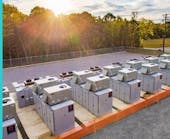The United States Department of Energy has awarded $9.5 million to NOMAD Transportable Power Systems (NOMAD) to bring long-duration energy storage to five rural communities in Vermont. The mobile energy storage systems will provide the communities with more reliable power and serve as a tool for emergency response while lowering costs and carbon.
“This project, enabled by the U.S. Department of Energy’s support, will ensure that the benefits of clean energy and long-duration storage reach communities that need them,” said NOMAD CEO Paul Coombs. “We are proud that the systems NOMAD builds here in Vermont will benefit rural communities of the Northeast that are too often left behind.”
When the batteries are not being used to prevent a specific outage, the stored energy will be used during peak power use times, such as during heatwaves, rather than pulling more energy from the grid. This will help lower electricity costs for all customers.
“Our priority is to provide reliability to these five communities, but because the NOMAD is mobile, it can be dispatched to provide emergency power to communities in need across the region. That flexibility broadens the impact of this grant,” added Coombs.
To complete the projects, NOMAD has partnered with Green Mountain Power (GMP), KORE Power, a lithium-ion battery cell and modules manufacturer, and EPRI, an electric reliability research organization.
GMP purchased the first Vermont-assembled NOMAD system and will deploy the new systems to create Resiliency Zones that strengthen the grid and prevent outages. GMP had already established a microgrid in Panton, and projects are currently underway in Brattleboro, Grafton, and Rochester. Each NOMAD unit is capable of providing power to nearly 50 homes for ten hours, and the units will incorporate EV charging capabilities so EVs in outage-stricken communities will have access to power.





